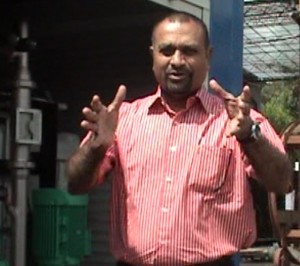Colloid mill for rubber emulsion: anionic latex emulsion; modified bitumen with rubber powder.
Construction professionals often come across the term “liquid rubber”. It is a common name for several types of waterproofing materials, however, the name is sometimes used ambiguously. For instance, acrylic polymer and polyurethane waterproofing mastic compounds are also referred to as “liquid rubber”, which is incorrect. “Liquid rubber” is a bi-component polymer-bitumen emulsion. Each word in the name is important: bi-component, bitumen-polymer, emulsion. Acrylic polymer, polyurethane and other waterproofing mastics are based on water, whereas the classic interpretation of the term implies emulsion of bitumen polymers, water and bitumen, with bitumen being the base of the emulsion.
The first questions for someone previously unfamiliar with the terms:
– What is bitumen?
– What are polymers?
– How to correctly select the required equipment?
– What is bitumen?
Bitumen (latin bitumen – mineral tar, oil) – is a product based on a mix of hydrocarbons or sulfuric, nitric, oxygenic and metallic derivatives. Physically bitumen is tar-like or solid, to reduce its viscosity, bitumen must be heated. Two varieties of bitumen exist: natural or artificial.
Natural bitumens are organic fossils based on hydrocarbons.
Artificial (process) bitumens — are residual products of oil, coal and slate processing. Their composition is similar to that of natural bitumens.
– What are polymers?
Polymer is a substance consisting of gigantic molecules, built of a multitude of bound atoms. Polymers contain repeating monomers, i.e. structural elements. Polymers can be thermoplastic and thermoset. Polymers allow production of stable plastic emulsions.
Bitumen emulsion is a dark brown liquid obtained by dispersing bitumen in water with a polymer. The ratio of water and bitumen determines one of the two types of emulsion: direct or inverted.
– How to correctly select the required equipment?
To correctly address the task and select the appropriate equipment, one important question needs to be answered: “What process exactly is required for the company? Is it emulsification, homogenization, suspension, solution or pulverization?” Not the least important is also the question of which material must be dispersed and in which substance. If the correct answers to these are known, GlobeCore staff will easily and professionally select the appropriate mixing equipment.
Expect professional communication and qualified answers regarding equipment selection for the required mixing task.
The main advantages of the wet grinding GlobeCore colloid mills are:
- Modern design and high quality of the device
- Competitive price
- Competent engineering consulting
- Fast production of the order
- The efficiency and speed of mixing at times more than a turbine agitator
- Savings on storage capacity compared with a turbine agitator – colloid mill built into a production line and does not require additional tanks
- Stability of the mix to stratification
- Heating/cooling jacket
- High-tech production lines and qualified staff (over 200) allows to expedite orders
- Ability to adjust the gap of the grinding zone without the need to remove the device from the production line
- Grinding to 1 micron
- Component parts from universally recognized manufacturers
- Operating temperature range from -30 С° to 180 С°
- Optional soundproofing
GlobeCore mills allow the produced emulsion to remain a stable liquid for at least 180 days.
|
No |
PARAMETER |
CLM 22 |
CLM 18 |
CLM 4 |
|---|---|---|---|---|
|
1 |
***Capacity rated, m³/hour, up to. |
22 |
18 |
4 |
|
2 |
Operating pressure, bar. |
0,5 |
0,5 |
0,5 |
|
3 |
Rotation speed, RPM |
3 000 |
3 000 |
3 000 |
|
4 |
**Max heat carrier temperature, °C |
160 |
160 |
160 |
|
5 |
**Minimum coolant temperature, °C |
-4 |
-4 |
-4 |
|
6 |
Dispersion, micron |
5 – 1 |
5 – 1 |
5 – 1 |
|
7 |
Solid phase content, % |
6 |
— |
— |
|
8 |
Nominal pressure/suction bore diameter, mm |
80/120 |
80/80 |
32/65 |
|
9 |
Drive power, kW |
55 |
11 |
5,5 |
|
10 |
*Dimensions, mm – length – width – height |
l/h/w: 1440 430 650 |
l/h/w: 1000 400 460 |
l/h/w: 960 310 400 |
|
11 |
Weight, kg |
490 |
135 |
125 |
Note.
* – Dimensions are driven assembly.
** – If necessary, the product can be either heated or cooled to a desired temperature.
*** – Depending on the physical and chemical characteristics of the product capacity may vary.
Clients speak about GlobeCore mills:

Mr. Shekanabo, the United Republic of Tanzania:
“I can only say good things about GlobeCore mills. After seeing the production facility, I had no doubts that this is a serious and reliable company with professional staff, and the system works like a clock. Of course, the production itself seems complicated, but the equipment is powerful and rugged.”

Mr. Patel, the United Republic of Tanzania:
“I want to wish GlobeCore success in the future and I think we will maintain our cooperation for many more years. May you have as many successful products and new developments as possible.”
